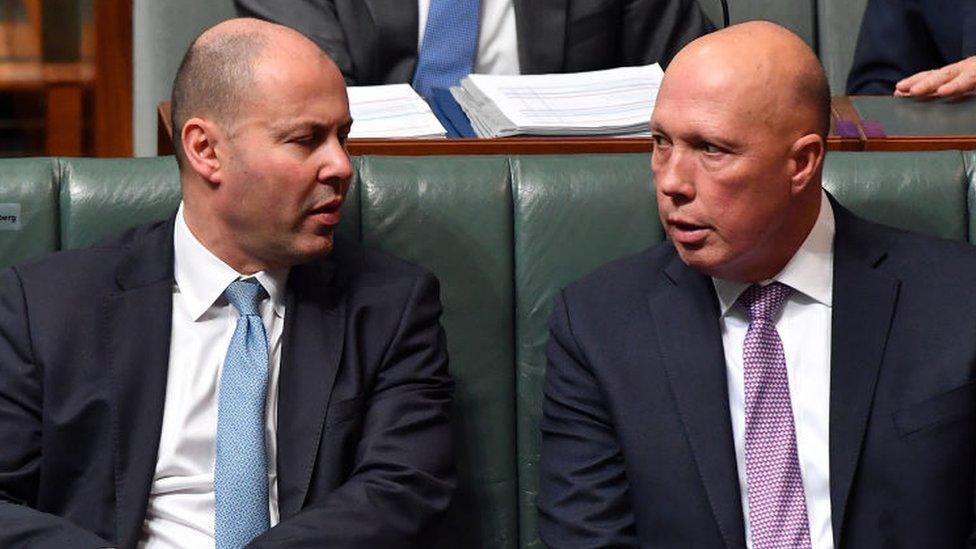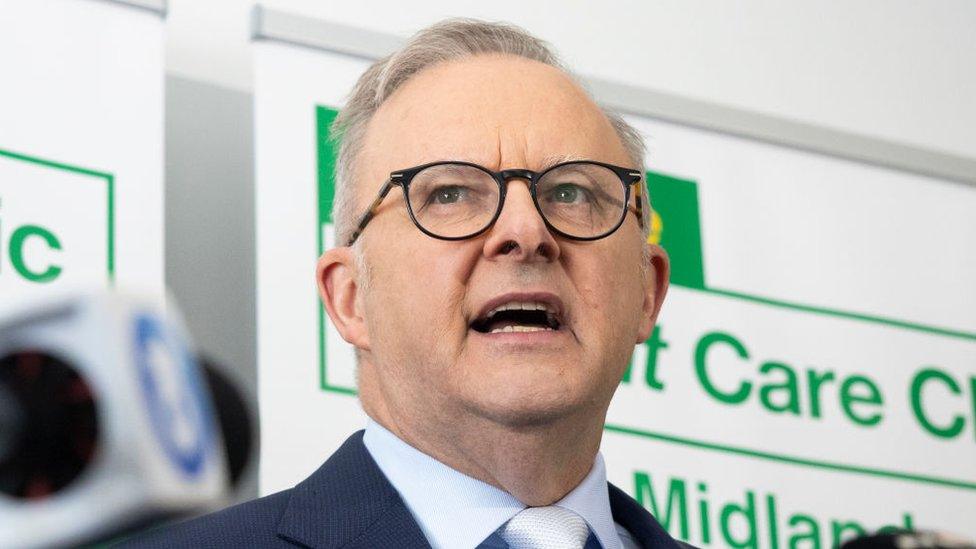Australia election: Anthony Albanese signals climate policy change
- Published
WATCH: New Australian PM says climate action "shouldn't be controversial"
Australia's new leader has vowed to take the country in a new direction, with a big shift in climate policy.
Anthony Albanese, who won Saturday's election with the opposition centre-left Labor Party, said Australia could become a renewable energy superpower.
He is to be sworn in as PM on Monday, but it is not clear whether his party will have a majority in parliament.
Climate change was a key concern for voters, after three years of record-breaking bushfire and flood events.
Outgoing PM Scott Morrison, the leader of an ousted Liberal-National coalition, thanked the "miracle of the Australian people" after conceding.
Vote counting is still going on and he is still a few seats short of the 76 that Labor needs to secure a majority in the 151-member lower house of parliament.
Final results may not be known for several days, as electoral officials have just started counting nearly three million postal votes.
If the election results in a hung parliament, Greens and independents - who have been campaigning for radical climate change action - could wield greater influence in framing the new government's policies on the issue.
Speaking to the BBC's Shaimaa Khalil shortly after his election victory, Mr Albanese, 59, said: "We have an opportunity now to end the climate wars in Australia.
"Australian businesses know that good action on climate change is good for jobs and good for our economy, and I want to join the global effort."
Mr Albanese, who will be heading Australia's first Labor government in almost a decade, also promised to adopt more ambitious emissions targets.
However, he has so far refused calls to phase out coal use or to block the opening of new coal mines.


A clear rejection of laggard climate policies
By Jay Savage, Australia editor
Anthony Albanese has vowed to "end the climate wars" that have poisoned Australia's will for emissions cuts in the past decade.
He now has a mandate. The rejection of Scott Morrison's government in the big cities was seismic. It's a clear repudiation of policies that have made Australia a climate laggard among rich nations.
Yet Labor has not been the biggest vote beneficiary. Unlike when the party last left opposition in 2007 on a big swing to Kevin Rudd, dubbed the "Ruddslide", this result has been separately claimed as a "tealslide" and a "Greenslide".
The surge in vote for those candidates has reshaped Australia's political landscape. Teal independents picked up key seats in Melbourne, Sydney and Perth.
Perhaps most incredibly, the Greens are on track to win three seats in Brisbane. While it is a different story regionally, the result has upended many perceptions of Queensland as Australia's most conservative state.
The teals and Greens want even stronger climate action than Mr Albanese, whose election pledges included a commitment to coal.
Some have already suggested they will lobby him for more ambitious goals. If Mr Albanese fails to secure a majority, their voices will be even louder.

Mr Albanese will fly to Tokyo on Monday for a summit with the leaders of Japan, India and the US, known as the Quad. As he will be representing Australia as its prime minister, he will be sworn into office before his departure.
"Obviously the Quad leaders meeting is an absolute priority for us," he told journalists on Sunday.
"It's an opportunity for us to send a message that there is a change of government and that there will be a change of policies on things like climate change.
"I will return to Australia on Wednesday and then we'll get down to business."
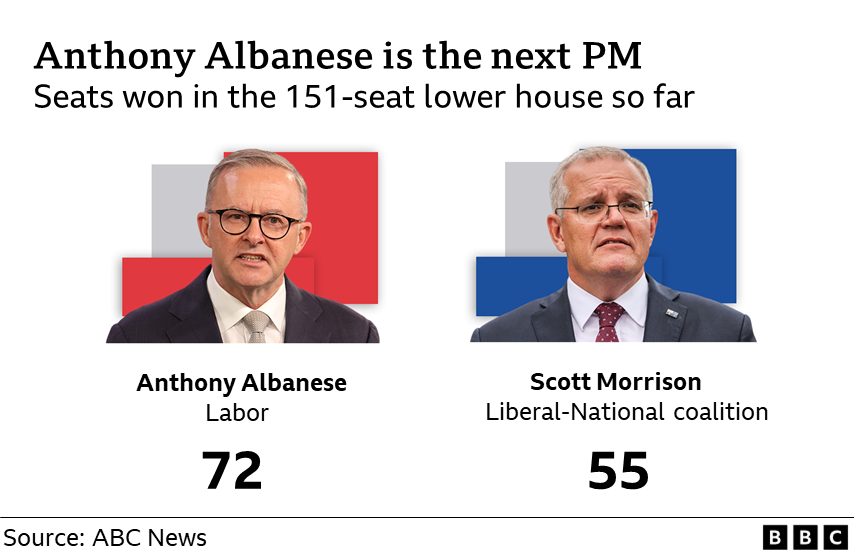

He said he wanted to "change the country and change the way that politics operates in this country".
One of Australia's longest-serving politicians, Mr Albanese served briefly as deputy prime minister to Kevin Rudd in 2013 and has long been a favourite of his party's left wing. Since becoming opposition leader in 2019, he has positioned himself more towards the centre.
'A time of great upheaval'
After taking over from Malcolm Turnbull in 2018, Mr Morrison led Australia through a period dominated by natural disasters and the pandemic.
He had been expected to narrowly lose the election, but the result showed a collapse in his vote.
The Coalition shed crucial seats to so-called "teal" independents, mostly women, in traditional inner-city Liberal strongholds. They had campaigned on platforms of climate action and integrity in politics.
Mr Morrison congratulated Mr Albanese and said he would step down as Liberal leader after the defeat.
He said it had been "a time of great upheaval".
"What Australians have endured over these past few years has shown a tremendous depth of character and resilience and strength," the outgoing prime minister said.
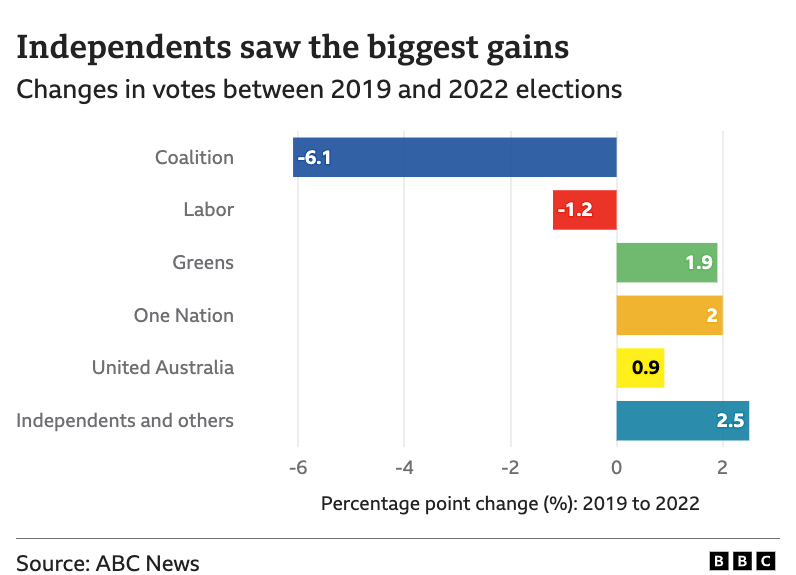

Mr Morrison, 54, is the first prime minister to serve a full term in office since John Howard in 2007.
Former Defence Minister Peter Dutton is seen as favourite to take over as Liberal leader, after former Treasurer Josh Frydenberg seemed set to lose his seat.
US President Joe Biden called Mr Albanese on Sunday to congratulate him on his victory.
The two countries are part of the Quad group, along with Japan and India, which is holding a summit in Tokyo on Tuesday. Mr Albanese has said he will be there, a decision welcomed by Mr Biden.
"President Biden reaffirmed the United States' steadfast commitment to the US-Australia alliance and his intent to work closely with the new government to make it stronger still," the White House said.
UK Prime Minister Boris Johnson said he looked forward to working with Mr Albanese "in the weeks, months and years ahead as, together, we tackle shared challenges and demonstrate the importance of our shared values".
New Zealand's PM Jacinda Ardern said she had "a warm conversation" with Mr Albanese, describing Australia as "our most important partner".
Indian PM Narendra Modi also congratulated Mr Albanese on his party's election victory.
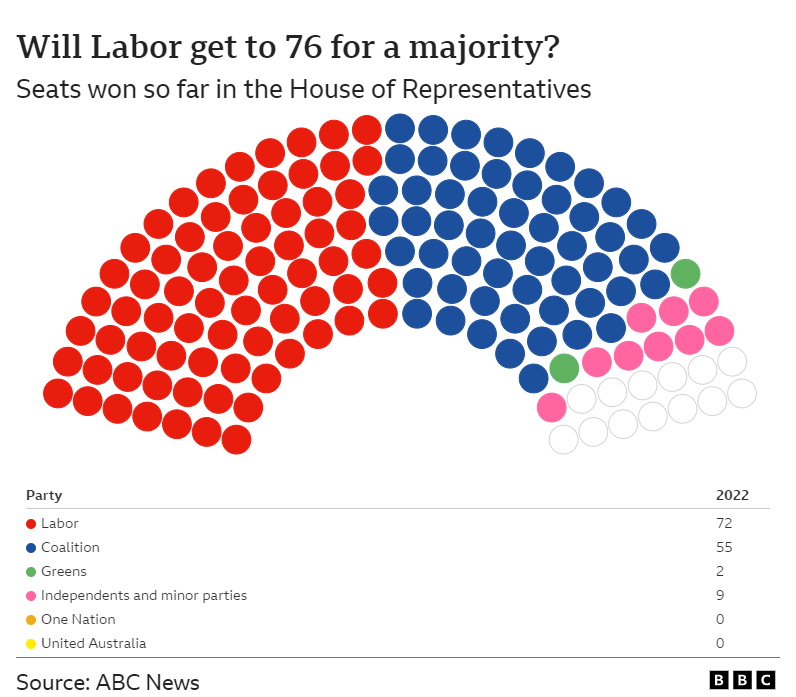

Related topics
- Published17 May 2022

- Published20 May 2022
